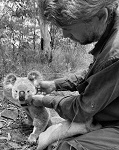Matthew Stanton
Candidature
PhD Candidate
Thesis Title
The Influence of Weather on the Diet, Behaviour and Physiology of the Marsupial Arboreal Folivore, the Koala (Phascolarctos cinereus)
Research Project
 Climate change is exposing Australian fauna to increased temperatures and more variable hydraulic conditions, both of which have been observed to negatively impact the koala.
Climate change is exposing Australian fauna to increased temperatures and more variable hydraulic conditions, both of which have been observed to negatively impact the koala.
For the koala, water is primarily from the same source as their energy and protein, i.e. through their food, Eucalyptus leaves. Thus, to source more water and energy, the koala must consume more leaves. However, koalas are limited in the amount of food they can consume by their gut capacity and slow gut passage rate. Furthermore, their food contains a diverse mixture of chemicals (plant secondary metabolites) which need to be detoxified or expelled in order to benefit from the energy, protein and water in the leaves. Detoxification of PSMs consumes energy and protein, and generates heat, further constraining leaf intake and increasing the risks of heat stress and dehydration under extreme environmental conditions.
This project aims to:
- Describe koala feeding and thermoregulatory behaviours in relation to weather and broader environmental conditions.
- Describe koala metabolic responses to weather conditions and investigate physiological limitations under extreme conditions such as heat-induced water stress.
- Investigate the dietary components that koalas select during times of high, moderate and low temperatures, particularly relating to water, nutrient and toxin constraints and how these factors relate to koala behaviour.
- Present the new data in the context of improving our mechanistic models of koala distribution under differing climatic scenarios.
Wild koalas will be tracked over two periods during which their habitat use, feed consumed and movement activity will be logged while their heart-rate and body temperature will also be measured. Innovative combinations of new technologies combined with a substantial investment in field observations will facilitate the data collection process. Leaf samples from koala selected trees will be analysed for water, available nitrogen and energy content, and concentrations of plant secondary metabolites to inform the observations of koala food choices through periods of cooler and warmer weather.
This study will enable an improved mechanistic species distribution model for the koala, to predict habitat suitability across NSW under predicted climate conditions, particularly to identify likely drought or heatwave refuges that will be essential to maintain the greatest distribution of the koala.
In summary the study will improve our understanding of koala ecology, and thus improve koala conservation efforts.
Research Supervisors
A/Prof Ben D Moore, Doctor Christopher Turbill, Doctor Eleanor Stalenberg